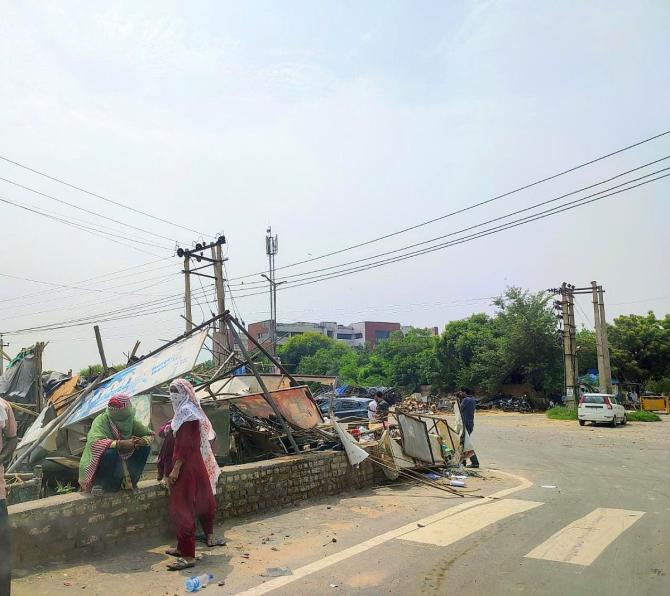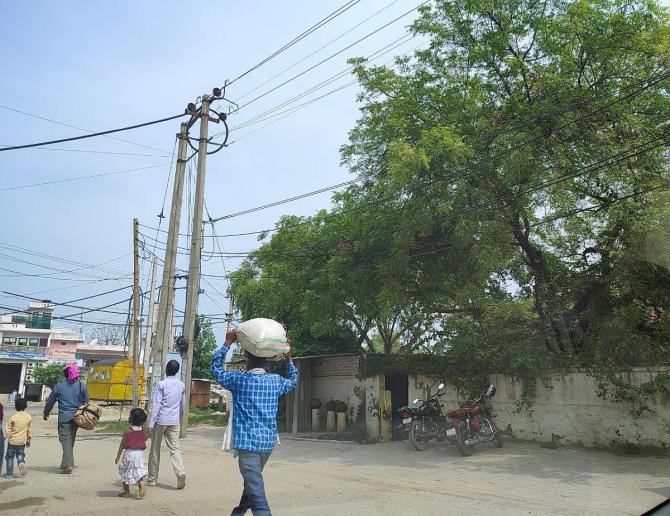'They are afraid that if they approach a police station for filing a complaint they might themselves get arrested under some random charges.'

Saif ul Islam, one of the advocate-members of the Association for Protection of Civil Rights, who visited the riot-affected areas of Mewat for two-and-a-half days, tells Prasanna D Zore/Rediff.com about what he and other members of the APCR team discovered in the region which saw communal violence for the first time in many years at the end of the 84 Kos Parikrama Yatra which began July 4 with the onset of the month of Shravan in north India.
APCR, established in 2006, works for the protection of human rights of the deprived sections of society and include members who are advocates, journalists and social and human rights activists.
What I Saw And Discovered In Nuh

The local administration has bulldozed almost 750 structures which include houses, road side paan shops, bicycle and scooter garages, tyre puncture garages, and small thelawalas.
These shops were bulldozed when a curfew was in place. These people who sell their wares on handcarts or sell cold drinks from small shops commute eight kilometres every day from their villages.
They were not served any notice that their business establishments were illegal; notices were served through backdated papers. These people pray that they were given a chance to vacate their premises. They had inventories of Rs 50,000-Rs 60,000 in their shops; some of these shops even had refrigerators.
There were about 105 shops opposite the Shaheed Hasan Khan Mewati Government Medical College in Nalhar -- go to any government hospital and you will see a number of chai and pakoda shops around it.
Out of 105, 90 shops belonged to Muslims. There were pathological labs, ultra sound and X-ray clinics too and without giving them any chance to remove the costly equipment the local administration just bulldozed these establishments.
They demolished shops of Hindus and Muslims.
Some of these owners knew that their shops were bulldozed only after three days.
Let us for argument's sake accept that the constructions were illegal but then if you go to any part of India -- urban or rural -- you will find illegal shops and establishments doing business at every street corner or main markets.
Like, local administrations across India show basic human concern towards such people, the Nuh administration should have also shown the same concern for these very poor and underprivileged people.
Our plea before the respected Punjab and Haryana high court would call for financial compensation for the damage to goods and their shops.
Women, the most affected

The arbitrary and illegal demolition drive carried out by both municipal authorities and the Haryana state's forest department has also affected women, who help their husbands run businesses.
53-year-old Ashmina, a widow, ran a pathology lab near the Nalhar medical college, along with her 17-year-old son. A mother to four sons, Ashmina had taken a loan worth Rs 10 lakh to run their pathology lab which was demolished. She informed the APCR fact-finding team that the lab was their only source of income, and their loan was yet to be repaid. No notice was served to Ashmina or her sons regarding the bulldozer action.
Owing to the existing atmosphere of fear in Nuh, so far no woman has taken legal action or spoken out about it, making it difficult to independently verify these claims. Three of the women APCR's fact-finding team spoke with in Meoli, whose male family members had been arrested, said they were 'extremely scared' to even go to the police and seek information on their arrested kin, as well as take any legal action to secure their release.
Farida, whose husband Azad was arrested at 5 am from Meoli village on August 1, was a milk supplier. She informed us that he was the sole breadwinner in their family, as she struggles to make ends meet now.
Azad's younger brother Salim has also been arrested, and both were picked up while taking the milk to the dairy. Farida, along with another woman Rizwana said they now have no means of income since the two men were arrested.
'How will we arrange for food and our children's education?' they asked.
45-year-old Rabia is another such woman now struggling to make ends meet for herself and her family. Her husband works as a truck-driver in Tamil Nadu, and she lived in Nalhar along with their five children. Their home was bulldozed without any proper notice, she claims, and she is now running pillar to post to find a place to live.
'How will I look after my kids? We have had to move to our relative's house, but it is difficult to sustain with five children.'
How APCR Plans To Seek Justice

Our plea would also call for actions against Monu Manesar and Bittu Bajarangi against whom video evidence is available about how they whipped up passions during the yatra. There has been no FIR lodged against these two in any of the police jurisdictions in Haryana.
We will be giving a letter to SP, Nuh, and if an FIR is not registered against these two then we will file a plea under Section 156 (Clause 3) of the Criminal Procedure Code (CrPC, which allows the police to investigate criminal cases without an FIR or magistrate's order).
Sometimes, due to political pressure police refuse to file an FIR or excuse them from filing an FIR saying that they are doing initial investigations.
Under such circumstances you file only a complaint and get a receipt of the complaint from the police. Then you take the help of Section 154 (Clause 3) after four-five days wherein you approach an ACP and say that since your complaint was not converted into an FIR despite producing ample evidence in the form of photographs, videos, etc.
The actual problem is that the people of Nuh are very poor. When I visited Meoli village, from where maximum arrests have been reported, I realised that the people of Meoli were not ready to lodge a complaint because they are afraid that if they approach a police station for filing a complaint they might themselves get arrested under some random charges.
Like a student from Jamshedpur who is doing his fellowship there was arrested. For four days nobody knew his whereabouts; only later did the cops inform that he was under detention at some police station there.
It is due to such issues we would like to take help of Section 154 (Clause 3), but then the ACP can, under political pressure, refuse to file an FIR and then we will have to take the help of Section 156 (Clause 3) which allows us to approach a magistrate for lodging an FIR.
If the magistrate also refuses to do so, then in the next days we will have the option to approach the high court with a PIL (public interest litigation).
This is how we plan to get at least FIRs registered against those who have not been charged by the police yet.
Kindly Note: All photographs were shot only after taking consent of the people seen in the photographs.
- Part 2 of the Interview: 'Muslims from Nuh have escaped to Rajasthan'










